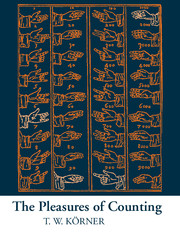Book contents
- Frontmatter
- Contents
- Preface
- I The uses of abstraction
- 1 Unfeeling statistics
- 2 Prelude to a battle
- 3 Blackett
- 4 Aircraft versus submarine
- II Meditations on measurement
- III The pleasures of computation
- IV Enigma variations
- V The pleasures of thought
- Appendix 1 Further reading
- Appendix 2 Some notations
- Appendix 3 Sources
- Bibliography
- Index
- Acknowledgements
3 - Blackett
Published online by Cambridge University Press: 05 May 2014
- Frontmatter
- Contents
- Preface
- I The uses of abstraction
- 1 Unfeeling statistics
- 2 Prelude to a battle
- 3 Blackett
- 4 Aircraft versus submarine
- II Meditations on measurement
- III The pleasures of computation
- IV Enigma variations
- V The pleasures of thought
- Appendix 1 Further reading
- Appendix 2 Some notations
- Appendix 3 Sources
- Bibliography
- Index
- Acknowledgements
Summary
Blackett at Jutland
In 1919 the British Admiralty decided that young officers whose education had been interrupted by the war should be sent to Cambridge for a six month course of general studies. Among them was Patrick Blackett who had seen action at the age of 17 in a naval battle off the Falklands. When the two greatest battle fleets the world had ever seen clashed off Jutland, he was a 19 year old gunnery officer on HMS Barham, flagship of the British Fifth Battle Squadron. The battle involved 110 000 men, of whom about 9000 were killed.
He remembered passing
the spot where the [battle-cruiser] Queen Mary had disappeared. The patch of oily water, where a dozen survivors of the crew of 1200 were clinging to pieces of wreckage, as I saw it through the periscope of the front turret of the Barham, gave me a strong awareness of the danger of assuming superiority over the enemy in military technique. …
In the first decade of this century, belief in the technical superiority of the British Navy was almost an article of national faith. This faith was shaken at Jutland, with the loss of three British battle-cruisers by explosions caused by enemy gun-fire. No major German ship blew up — in fact, none were sunk during the action, though one was so badly damaged that it was later sunk by the crew. What was wrong with the British battle-cruisers? The answer is simple.[…]
- Type
- Chapter
- Information
- The Pleasures of Counting , pp. 38 - 61Publisher: Cambridge University PressPrint publication year: 1996



